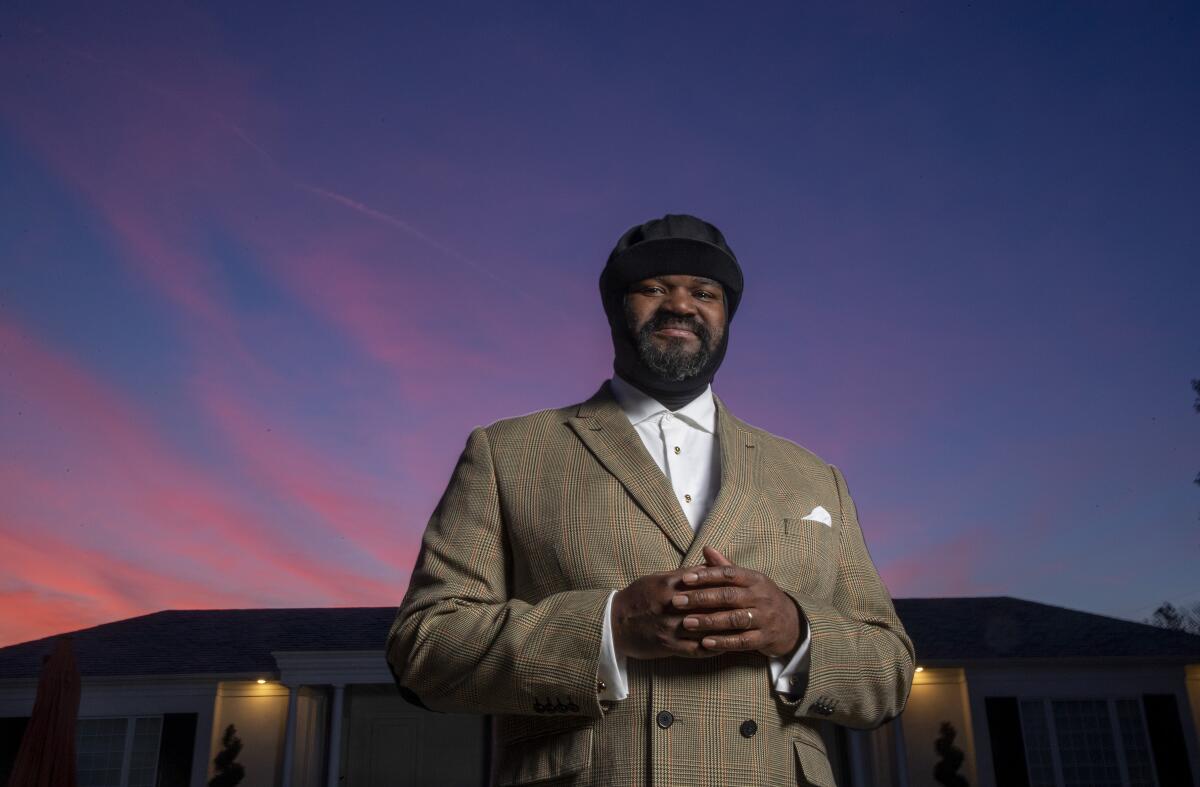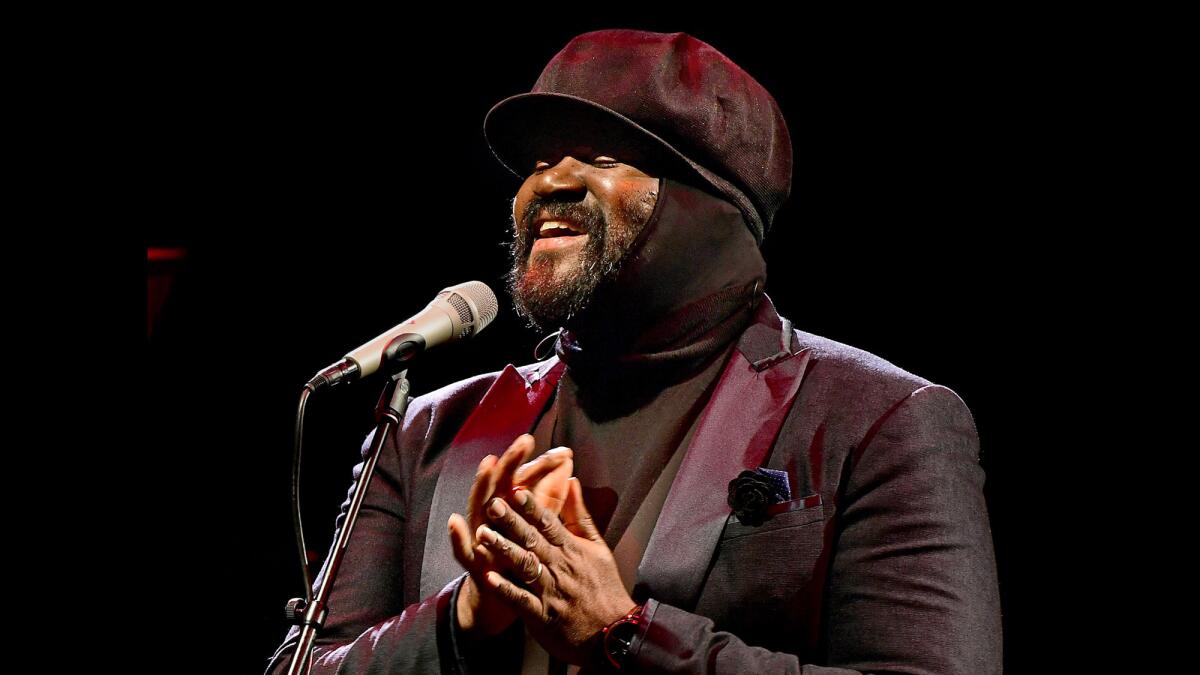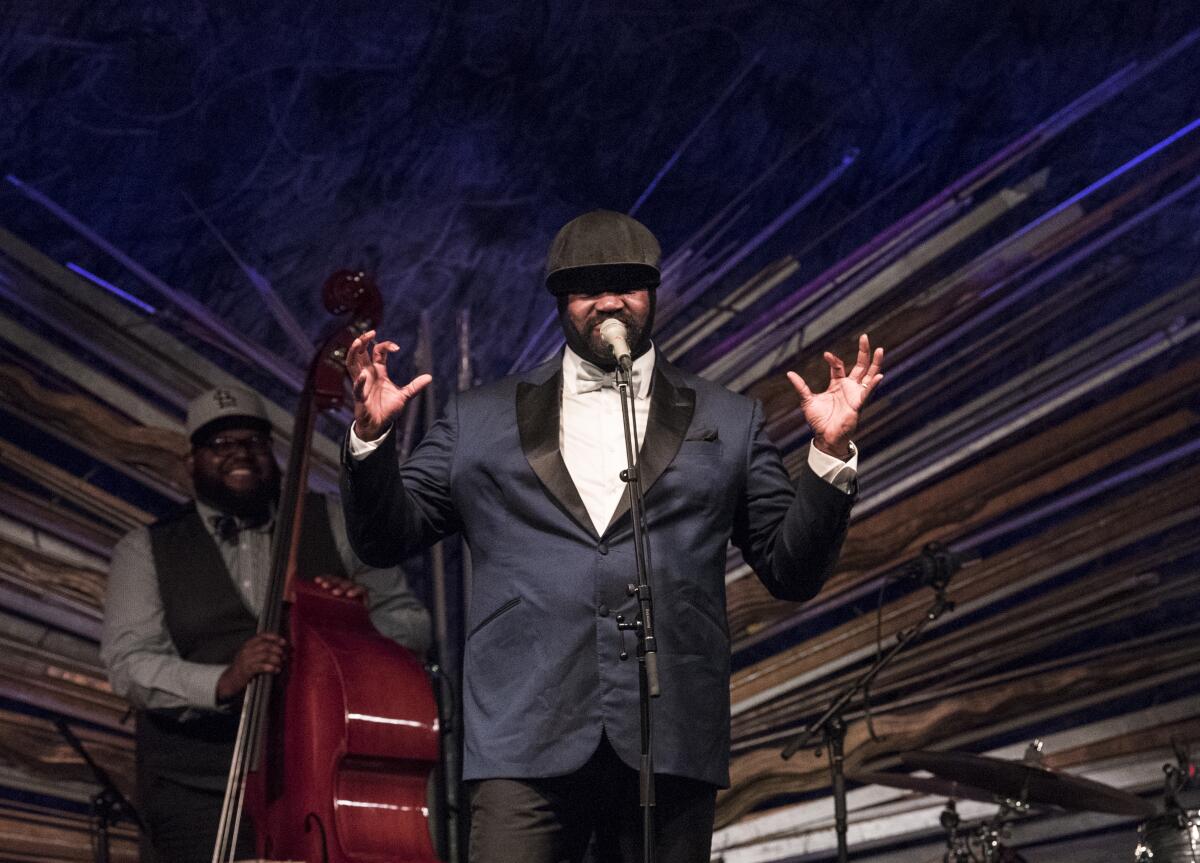Gregory Porter sings of love, but unspeakable grief and the scars of racism lie just beneath

- Share via
BAKERSFIELD — In February of this year, vocalist Gregory Porter stood at his kitchen island effortlessly chopping long, uniform strips of red cabbage. Several liberally seasoned cuts of salmon were sizzling in a pan behind him. His Georgian-style estate, with its half-circle driveway and sparkling rectangular pool, lies hidden in the center of Bakersfield, a two-hour commute from his usual recording studio in Hollywood’s Capitol Records tower. “I thought it was too big,” Porter, 48, said. “But maybe it could work. This house cost the same as a two-bedroom apartment in Brooklyn.”
Six months later, on the cusp of the delayed release of his lush gospel/jazz/soul album, “All Rise,” Porter is finding his scorching sprawl one of the few bright spots during his extended period of involuntarily self-reflection.
“Music was a thing to make me feel better,” he says. “Everything was happening at the same time, and the idea of having a community of people to emote with was important to me. I probably could’ve found it in a church, but there was something about expressing myself in jazz. I could vent my anger as well as my love.”

Born in Sacramento and raised in Bakersfield, Porter is the seventh of eight children. His mother was a minister who catered to some of the most down-and-out parishioners a community could assemble. His father was far less of a presence. Amid plucky horns on his newest release, Porter admonishes, “He didn’t teach me a dad gone thing — except how to sing.” His brother Lloyd, a year older, was a far more nurturing presence, a confidant and artistic collaborator. Lloyd directed his brother’s first few music videos, which were filmed at his Brooklyn coffee shop, Bread Love. Lloyd succumbed to COVID-19 in early May.
“My experiences are his experiences,” Porter says by telephone this month. “We went through everything together. From here going forward there will be a big void. I know it will affect me profoundly.”
In 1989, Porter was accepted to San Diego State University on a football scholarship. Two years in, he suffered an injury that ended his sports career. His mother died from cancer not long after and suddenly everything Porter had relied on was gone. After classes, he began attending jazz jam sessions around Southern California, eventually booking his powerful baritone on a touring production of “It Aint’ Nothin’ but the Blues.” When the show moved to New York, so did Porter, and he stayed there for a decade, working catering gigs for his brother in-between sets around Brooklyn and Harlem. He moved back to California not long after winning the Grammy for jazz vocal album in 2014.
His Bakersfield home, which he shares with his wife and 7-year-old son, immediately became the family focus. “Christmas here is insane. There are 35 kids downstairs, old people in the living room, drunks are on the patio. I have a big family, and that is a big part of my reason for coming back. What reason do we have to get together? And where are we going to do it? Everybody is here but they don’t have to talk to each other, and if they’ve got a problem I don’t want to hear it!”

By the time he returned, nearly all of the churches that the Porter family had sermonized in along Lakeview Avenue and Union Avenue were rubble. That world only exists now in memory. And in Porter’s set list. “Take me to the afflicted ones, take me to the lonely ones that somehow lost their way,” Porter sang on 2013’s “Take Me to the Alley.”
Those streets now have become overgrown with trash and weeds. In February, as he drove through the old neighborhood, Porter gazed out the window listing what once was but is far from returning. He is fiercely loyal to the neighborhood, occasionally recording at a small downtown studio and doing what he can to bring his music to the area and revitalize the community.
“Bakersfield is not a small town, but they sure keep it that way,” says Porter of the 52nd most populated city in America. “The infrastructure is not there. The art is not there. You can go to a 50,000-person city in France and they have a museum and an orchestra and it’ll be really high level. We’re not there. It seems like they are pulling a lot of oil out of the ground. So somebody could be doing more.”
His childhood home in the northeast corner of town looms over Oildale, an uninspired outcropping of barren land and parasitic derricks. Upon seeing his old home, Porter reflected on the time his oldest brother was shot walking home from the oil fields and the repeated harassment from the local chapter of the KKK, his corner window a frequent target of the ignorant and belligerent.
“Mama used to fear for me,” Porter sings on “All Rise”’s Billy Preston-esque soul spiritual “Mr. Holland.” “When you walk out in the world, you see, some people will fear your face and name.”
Porter is blunt about his experiences growing up in Bakersfield in the 1980s. “The neighbors that called the police on me on my way home from school. Or when police would randomly stop me and ask me my address. That can take a toll on a person. I was a little boy dealing with grown men and women who were acting out their racism on me. It’s a sickness and I didn’t have the words. I didn’t have the equipment.”

Porter is inspired by this summer’s Black Lives Matter protests and hopeful for a more hospitable world for his son. “We all saw a man have his breath taken away, and there are so many more instances never caught or talked about. Sometimes I’m at a loss for words from my son’s powerful questions. I’m almost pathologically optimistic about love,” he says. “I’m OK with cliché and naiveté and being considered a fool for love. I’m OK with that because the payoff is love.”
The man onstage is the same man standing in his kitchen. “All Rise” is a lush production that leans hard on his gospel roots and soulful baritone. Hand claps and a stark piano line set the tone for “Revival” while “If Love is Overrated,” a sentimental ballad backed by the London Symphony Orchestra, is geared toward the swooning, candlelit crowd.
While Porter has done well in the U.S., he has found greater success in Europe. He typically plays more than 200 gigs a year, and his summer plans included crisscrossing the continent for festivals and concert halls. He is a household name in the U.K., appearing regularly on television. “Liquid Spirit,” the title track from his Grammy-winning 2013 release, became a launching pad for DJ remixes, spreading his message far beyond the jazz cognoscenti. “A song that I wrote from the memories of my mother’s sermons is listened to a half-billion times,” Porter says wistfully. “That’s cool.”

He has been understandably wary and subdued during the pandemic. He has not been writing much during this downtime, focusing mostly on his family and connecting with the beauty of Central California, concluding, “Birds are the best singers in the world.”
“Sometimes you have to calm down and come to an equilibrium and be more honest with yourself as a musician. Of course, I say that after having written songs after drinking a bottle of wine. But I think the fear and anger and disappointment that has come over me during this time has been extraordinary. My missing and longing is so deep that it can overwhelm my pen. I have returned to listening to my own music. Not in a narcissistic way but to lift me up. My brother is in that music. My mother is in that music. I was re-listening to the new album last week, and I didn’t hear it when I was in the studio but I thought, ‘Dang, Bakersfield is on this record too.’”
More to Read
The biggest entertainment stories
Get our big stories about Hollywood, film, television, music, arts, culture and more right in your inbox as soon as they publish.
You may occasionally receive promotional content from the Los Angeles Times.









